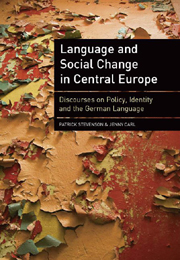Book contents
- Frontmatter
- Contents
- Acknowledgements
- List of Tables
- Transcription Conventions
- Map of Central Europe
- 1 Introduction
- 2 Discourses on Language in Social Life: Theoretical and Methodological Orientations
- 3 Sociolinguistic Histories and the Footprint of German in Eastern Central Europe
- 4 Language Policy Discourses: Interventions and Intersections
- 5 Language (Auto)biographies: Narrating Multilingual Selves
- 6 Language Ideologies: Negotiating Linguistic Identities
- 7 Conclusions
- Appendix A European Institutions and Documents Concerning Language Policy
- Appendix B Preamble to the European Charter for Regional or Minority Languages
- Appendix C Introduction to the 2005 Commission Communication ‘A New Framework Strategy for Multilingualism’
- Appendix D Introduction to the 2008 Commission Communication ‘Multilingualism: an asset for Europe and a shared commitment’
- Appendix E German and Austrian agents and institutions in foreign cultural policy
- Appendix F Extract from ‘Auswärtige Kulturpolitik – Konzeption 2000’
- Appendix G Central focus – ‘Leitbild’ – of the Goethe-Institut
- Appendix H Austria's Auslandskulturkonzept NEU
- Appendix I Plattform Kultur Mitteleuropa – Platform Culture Central Europe
- Appendix J Extract from Austria kulturint – Tätigkeitsbericht 2002
- Appendix K Czech 2001 White Paper on Education
- Appendix L Czech 2004 Education Act
- Appendix M Extract from Czech Follow-up of Action Plan on Language Learning and Linguistic Diversity
- Appendix N Hungarian 1997 Directive Concerning the Education for National and Ethnic Minorities
- Appendix O Extract from 2007 Hungarian National Core Curriculum
- Appendix P Extract from Hungarian Follow-up of Action Plan for Language Learning and Linguistic Diversity
- References
- Index
Appendix H - Austria's Auslandskulturkonzept NEU
Published online by Cambridge University Press: 05 February 2013
- Frontmatter
- Contents
- Acknowledgements
- List of Tables
- Transcription Conventions
- Map of Central Europe
- 1 Introduction
- 2 Discourses on Language in Social Life: Theoretical and Methodological Orientations
- 3 Sociolinguistic Histories and the Footprint of German in Eastern Central Europe
- 4 Language Policy Discourses: Interventions and Intersections
- 5 Language (Auto)biographies: Narrating Multilingual Selves
- 6 Language Ideologies: Negotiating Linguistic Identities
- 7 Conclusions
- Appendix A European Institutions and Documents Concerning Language Policy
- Appendix B Preamble to the European Charter for Regional or Minority Languages
- Appendix C Introduction to the 2005 Commission Communication ‘A New Framework Strategy for Multilingualism’
- Appendix D Introduction to the 2008 Commission Communication ‘Multilingualism: an asset for Europe and a shared commitment’
- Appendix E German and Austrian agents and institutions in foreign cultural policy
- Appendix F Extract from ‘Auswärtige Kulturpolitik – Konzeption 2000’
- Appendix G Central focus – ‘Leitbild’ – of the Goethe-Institut
- Appendix H Austria's Auslandskulturkonzept NEU
- Appendix I Plattform Kultur Mitteleuropa – Platform Culture Central Europe
- Appendix J Extract from Austria kulturint – Tätigkeitsbericht 2002
- Appendix K Czech 2001 White Paper on Education
- Appendix L Czech 2004 Education Act
- Appendix M Extract from Czech Follow-up of Action Plan on Language Learning and Linguistic Diversity
- Appendix N Hungarian 1997 Directive Concerning the Education for National and Ethnic Minorities
- Appendix O Extract from 2007 Hungarian National Core Curriculum
- Appendix P Extract from Hungarian Follow-up of Action Plan for Language Learning and Linguistic Diversity
- References
- Index
Summary
Schwerpunkte
Kernaussagen:
Der Auslandskulturpolitik liegt ein Konzept geographischer Schwerpunkte zugrunde:
Globale Kulturzentren: New York, London, Paris, Rom, Tokio, Madrid, Moskau, Berlin
Kulturelle Nachbarn (Staaten mit traditionell engen kulturellen Beziehungen, wie z.B. Ungarn, Tschechische Republik, Slowakei, Slowenien, Polen, Deutschland, Italien, Israel) unter Einschluss Südosteuropas (z.B. Kroatien, Bulgarien, Bundesrepublik Jugoslawien, Türkei)
Entwicklungspartner (Schwerpunktländer EZA und Osthilfe, südlicher Kaukasus)
Die Auslandskulturpolitik setzt inhaltliche Schwerpunkte:
Europa und die europäischen Werte: Diskussion um Europa und die “europäischen Werte’ in Groβveranstaltungen und Seminaren in europäischen Hauptstädten Innovation aus Traditionen: Respektierte Traditionen nicht als Klischees festschreiben, sondern als Ausgangspunkt für Innovation nützen
Facing History: Auseinandersetzung mit der österreichischen Geschichte im 20. Jahrhundert (z. B. Vertriebene Kunst, Exilliteratur, jüdisch-österreichische Traditionen, Habsburgermythos, Widerstand vor 38, Aufarbeitung nach 45)
Culture for Enlargement: Österreich als Partner der mitteleuropäischen Nachbarn (z. B. gemeinsame Kunst- und Kulturprojekte, Diskussionen zu Abbau von nationalen Stereotypen und Vorurteilen)
Culture for Stability: Der Beitrag der Kultur zur Stabilisierung des Balkans (z. B. Projekte zur Stärkung von Demokratie und Zivilgesellschaft, neue Österreich-Bibliotheken in Serbien, Mazedonien und Moldawien),
Culture for Development: Kulturkooperation im Dialog mit unseren Partnerländern in der Dritten Welt.
Mit der Zeitenwende 1989, die ein Ende der geopolitischen Teilung Europas gebracht hat und in Europa Kultur zum Grundmuster internationaler Beziehungen gemacht hat, sowie dem österreichischen EU-Beitritt 1995 haben sich die Voraussetzungen und Möglichkeiten der Auslandskulturpolitik grundlegend geändert.
Ohne Schwerpunktsetzungen mit einem klaren und nachvollziehbaren Profil kann österreichische Kulturarbeit im Ausland nicht zu einem nationalen Anliegen gemacht werden.
- Type
- Chapter
- Information
- Language and Social Change in Central EuropeDiscourses on Policy, Identity and the German Language, pp. 227 - 229Publisher: Edinburgh University PressPrint publication year: 2010



